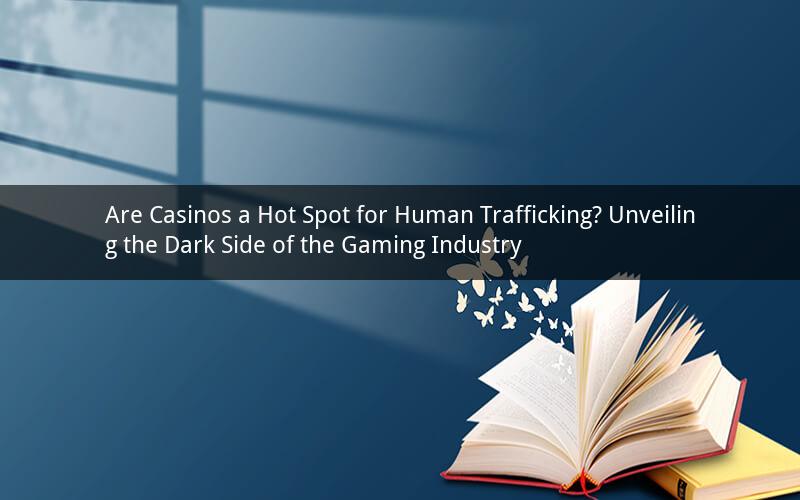
Introduction:
Casinos, often regarded as glamorous destinations where luck and excitement collide, have long been a popular spot for tourists and gamblers alike. However, behind the glitz and glamour lies a darker reality that raises concerns about human trafficking. This article delves into the issue of whether casinos are indeed hot spots for human trafficking, exploring the factors that contribute to this concern and the potential risks involved.
1. The Connection Between Casinos and Human Trafficking:
Human trafficking involves the exploitation of individuals for forced labor or sexual purposes. While it is a global issue, there are concerns that casinos, with their high levels of cash transactions, discreet environments, and vulnerability of individuals seeking entertainment or employment, may become breeding grounds for human trafficking activities. Let's examine some factors that contribute to this connection:
a. Cash-Intensive Operations: Casinos operate on a cash basis, making them prime targets for money laundering. This allows traffickers to discreetly exchange money for services or labor.
b. Discreet Environments: The secluded nature of casinos provides a veil of secrecy, making it easier for traffickers to operate without detection. The presence of private rooms, secluded areas, and high levels of surveillance can make it challenging for authorities to monitor suspicious activities.
c. Vulnerable Individuals: Casinos attract a diverse range of individuals, including those seeking entertainment, employment, or escape from their realities. Some may become vulnerable targets for traffickers who exploit their vulnerabilities.
2. Potential Risks for Trafficked Individuals:
If casinos are indeed hot spots for human trafficking, it raises concerns about the well-being and rights of the individuals involved. Here are some potential risks faced by trafficked individuals:
a. Sexual Exploitation: Trafficked individuals may be forced into prostitution or other forms of sexual exploitation within casinos.
b. Forced Labor: Some individuals may be coerced into performing labor-intensive tasks, such as cleaning, serving, or working in other capacities within the casino.
c. Psychological and Physical Abuse: Trafficked individuals often face psychological and physical abuse, including threats, violence, and confinement.
3. Countermeasures and Initiatives:
To combat the potential connection between casinos and human trafficking, various countermeasures and initiatives have been implemented:
a. Training and Awareness: Casinos have been encouraged to provide training to staff members on recognizing signs of human trafficking and how to report suspicious activities.
b. Collaboration with Law Enforcement: Casinos have been advised to collaborate with law enforcement agencies to monitor and report any suspicious activities that may indicate human trafficking.
c. Support Services: Organizations working to combat human trafficking have been encouraged to establish support services for trafficked individuals within the vicinity of casinos.
4. Challenges in Addressing the Issue:
Despite the efforts to combat human trafficking within casinos, there are several challenges that need to be addressed:
a. Underreporting: There is a possibility of underreporting incidents of human trafficking within casinos due to fear, shame, or a lack of awareness among potential victims.
b. Limited Resources: Combating human trafficking requires significant resources, including personnel, training, and technology. Limited resources can hinder effective monitoring and intervention.
c. Legal and Policy Gaps: There may be gaps in legal frameworks and policies that need to be addressed to provide adequate protection and support for trafficked individuals.
Conclusion:
While there is no definitive evidence to confirm that casinos are hot spots for human trafficking, the potential risks and concerns cannot be ignored. It is crucial for casinos, law enforcement agencies, and organizations working to combat human trafficking to collaborate and implement effective measures to protect vulnerable individuals and combat this heinous crime.
Questions and Answers:
1. What are the signs of human trafficking that casino staff should be aware of?
Casino staff should be trained to recognize signs such as individuals who appear to be under the control of others, signs of physical or psychological abuse, or individuals who are unable to provide identification or explain their whereabouts.
2. How can casinos contribute to the fight against human trafficking?
Casinos can contribute by implementing anti-trafficking policies, providing training to staff, collaborating with law enforcement agencies, and establishing support services for potential victims.
3. What role do law enforcement agencies play in addressing human trafficking within casinos?
Law enforcement agencies play a crucial role in monitoring and investigating suspicious activities within casinos, providing support to potential victims, and ensuring that traffickers are held accountable.
4. How can organizations working to combat human trafficking collaborate with casinos?
Organizations can collaborate with casinos by providing training and resources, establishing referral networks, and working together to create awareness campaigns about human trafficking within the gaming industry.
5. What steps can individuals take to report suspected human trafficking within casinos?
Individuals who suspect human trafficking within casinos can report their concerns to local law enforcement agencies, anti-trafficking organizations, or helplines dedicated to assisting potential victims. It is essential to provide as much information as possible to assist authorities in their investigations.